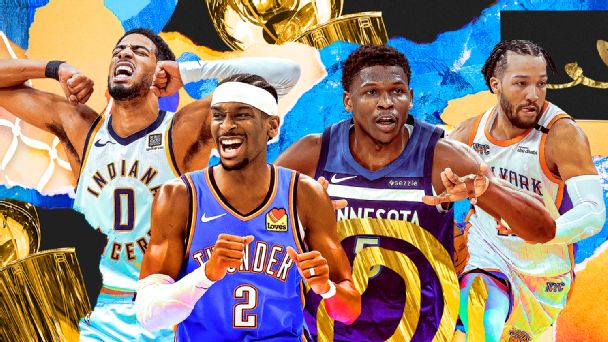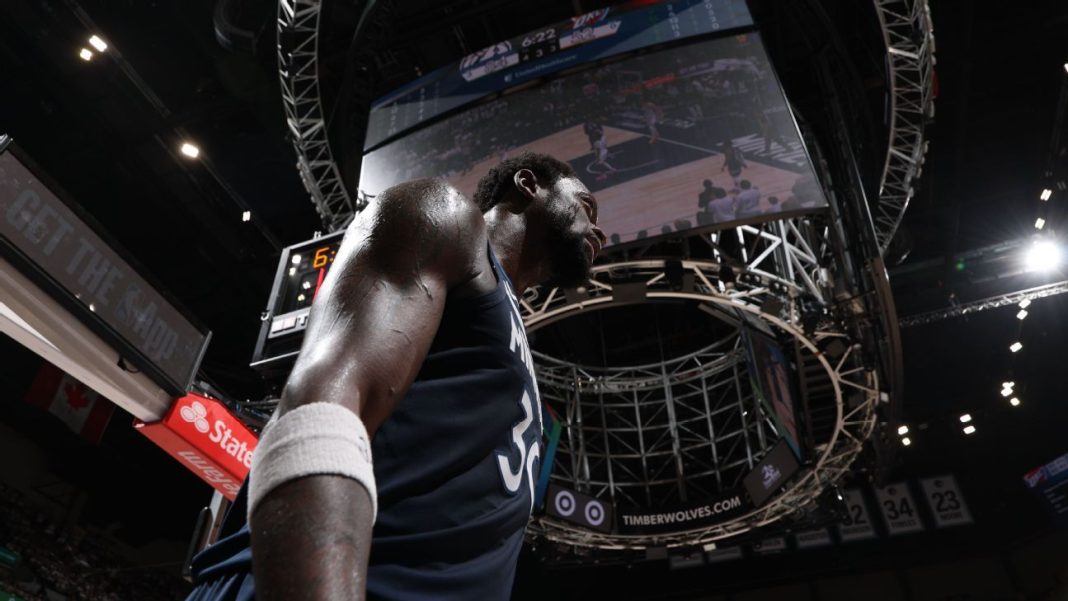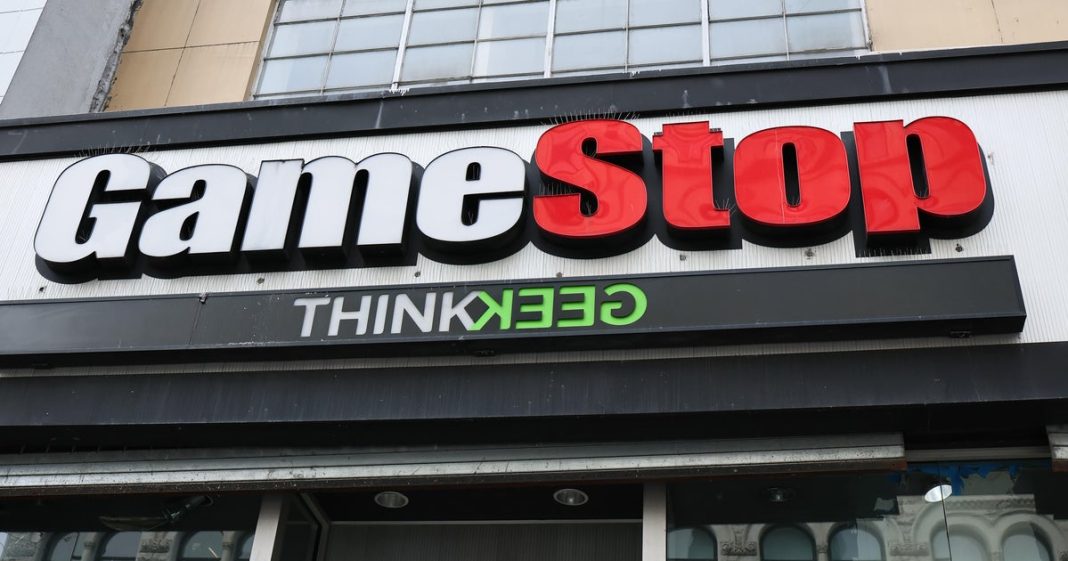

IN A GAME the Minnesota Timberwolves desperately needed, Julius Randle played miserably.
His five points were the fewest he’d ever scored in a playoff game, eclipsing his previous career low of six, set just two games earlier. He’d attempted only seven shots, making one of them. He had five turnovers. But more than that, for much of the game, he was invisible.
Sitting in front of his locker after Monday’s 128-126 loss to the Oklahoma City Thunder put Minnesota in a 3-1 deficit in the Western Conference finals, Randle had no answers for why he flatlined in Game 4, after he had consistently infused so much life into the Wolves’ playoff run.
“I don’t know, to be honest,” Randle said. “I think it was just a lot of me just spectating.”
What he saw was Minnesota missing its chance to tie up its series with Oklahoma City and apply real pressure to a 68-win Thunder team that dominated the NBA this season.
Instead, now the Wolves’ season is on the brink, and when asked whether the coaching staff could’ve done more to get him involved, Randle owned his performance. “I’ll always take the responsibility for myself,” he said. “I’ve got to figure it out first.”
Randle’s difficulties in Game 4 echo some of his struggles throughout his career. At 6-foot-9, he has the quickness and ball-distribution skills of a guard, but sometimes he plays out of control. At a sturdy 250 pounds, he has the strength to battle in the post but often lacks the height and length of the centers he’s matched up with.
His time in the league has coincided with the 3-point revolution, and while he has become a capable outside shooter (33.4% from 3), he’s not a particularly reliable one.
His production and work ethic make it impossible to dismiss him, yet the questions persist: Can he eliminate his bouts of inconsistency? What’s the best way to unlock him as the winner he strives to be?
No matter what happens in Game 5 and beyond, it has been a season of discovery for the 30-year-old Randle. The three-time All-Star has, for the first time, been cast in a supporting role on a team with championship aspirations. This, after whispers had followed him when his last team made more noise in the 2024 postseason when he was sidelined with a shoulder injury than they did when he was in uniform.
“[That was the] change and adjustment for me throughout the year,” Randle told ESPN. “It was like, ‘All right, how can I play a style of basketball that’s going to be beneficial to our team and drive winning when it matters the most?'”
IF THERE WAS a single moment to capture the magic of the Timberwolves’ 2025 playoff run, it might be a sequence from their Game 3 blowout over the Thunder, when Randle attacked league MVP Shai Gilgeous-Alexander with a left-to-right crossover, then rose up to connect on a jumper that snapped the net and sent the crowd into a tizzy.
The shot put the Wolves up by 38 points with 4:25 remaining in the third quarter and forced the Thunder to burn a timeout. OKC, the NBA’s No. 1 seed, was completely out of sorts, looking nothing like the group that went up 2-0 against sixth-seeded Minnesota at Paycom Center to begin the series.
As both teams retreated to their respective benches and the Wolves faithful howled from the stands, a wide-eyed Randle delivered a message, pointing his fingers at the Target Center’s hardwood court below his feet.
“We home now!” Randle roared. “We home now!”
His declaration was directed at Minnesota shifting the competitive balance of the series with the franchise’s first trip to the NBA Finals on the line, as the Wolves went on to win Game 3 by 42 points after losing the first two games by a combined 41.
But the additional meaning, whether intended or not, was obvious.
He has found an unexpected home after a surprise trade from the New York Knicks brought him to Minneapolis just two days before training camp. The Wolves were Randle’s fourth team since being drafted with the seventh pick by the Los Angeles Lakers in 2014, when L.A. was beginning its long rebuild at the tail end of Kobe Bryant’s 20-year career.
He was reunited this season with Timberwolves coach Chris Finch, who was an assistant with the New Orleans Pelicans on the second stop of Randle’s career. He’s bonded with Wolves president of basketball operations, Tim Connelly, who Randle reverently refers to as a “foodie,” sampling the Twin Cities restaurant scene together. He and his wife, Kendra, welcomed their third child, daughter Romi, during this postseason.
He has become celebrated as a centerpiece of the Wolves’ repeat run to the conference finals. A 30-foot vertical billboard on the corner of N. 1st Ave and N. 7th St. above O’Donovan’s Irish Pub, across the street from the arena, depicts him and Anthony Edwards standing together, smiling ear-to-ear, with the team’s “Wolves Back” playoff slogan printed above them.
“I feel like there’s been a bad narrative going around about him, as far as the type of person he is,” Edwards told ESPN. “He’s the coolest person. He’s one of the coolest people I’ve ever met. I love Julius, man.”
Randle finished Game 3 with 24 points on 9-for-15 shooting — going 7-for-11 on contested shots, according to ESPN Research — with three assists and no turnovers against the Thunder’s ball-hawking defense.
Edwards finished with 30 points, accounting for the eighth time this postseason both he and Randle topped the 20-point plateau in a game — the most by a Wolves duo in a single playoff run.
On the other side of the ball, Randle held Gilgeous-Alexander and Jalen Williams to 2-for-8 shooting as their primary defender.
Then, some 48 hours later, Randle played the worst playoff game of his career.
“I think the biggest thing is,” Randle told ESPN, “how do you bounce back after adversity? That’s always been the theme of my career. How can you bounce back? How can you be better? How can you learn?”
THE TRADE THAT brought Randle to Minnesota, and sent star Karl-Anthony Towns to the Knicks, reminds new Wolves limited partner Alex Rodriguez of a deal nearly 30 years ago, from his days on the diamond. In the summer of 1998, Rodriguez’s Seattle Mariners traded franchise icon Randy Johnson to the Houston Astros, and received Freddy Garcia, John Halama and Carlos Guillen in return.
The deal was largely panned. Johnson went 10-1 with a 1.28 ERA for the Astros down the stretch, helping Houston to its first 100-win season in team history.
“Everyone thought, ‘Oh my God, we just got body slammed,'” Rodriguez, whose ownership transition with Minnesota is pending a Board of Governors vote, told ESPN. “Same reaction like with KAT. Everybody was down on Seattle.”
In time, Garcia was a two-time All-Star for the Mariners, who finished third in Cy Young Award voting in 2001 and eventually won a World Series with the Chicago White Sox in 2005. Halama, a lefty pitcher, had three double-digit-win seasons in Seattle. Guillen played 140 games for the 2001 Mariners squad that tied the all-time MLB record for wins in a season with 116.
And so it went for the Wolves, too. They started the season 8-10 and were still hovering around .500 after the All-Star break while Randle was sidelined with a groin injury — before the value of the deal showed for Minnesota, other than the obvious salary cap maneuverability it provided. (Towns was signed to an escalating contract that rises from $53.1 million to $57.1 million to $61 million in the next three years; Randle has a player option for next season worth $30.9 million.)
“It was not always pretty on the floor, it wasn’t always pretty off the floor,” Finch said. “We had a lot of frustrations throughout the season, but they all came from a good place, everyone trying to make it work. And I think Julius’ connection with his teammates has gotten better and better.”
Randle missed 13 games (the entire month of February) with a strained right adductor and Minnesota went 5-8 without him. But the absence provided Randle with an opportunity, one he hadn’t been afforded with the preseason trade: time.
“I got to really watch the guys. … I got to really see guys up close and personal and really just evaluate, like, ‘All right, this is how I can help,'” Randle said. “And then I think from there, it was just kind of night and day when I was able to come back.”
Still, even before the injury, Randle’s fit was clunky. On Jan. 17, in his first game at Madison Square Garden against his former team, Randle went just 2-for-6 from the field but filled out the box score with seven rebounds and six assists. He had a plus-minus of plus-20 in a game Minnesota won by 17.
“He settled into his role,” a source close to Randle told ESPN. “He was taking double teams and making the easy pass or finding the swing pass to set up his teammates.”
Two games later, however, Randle went 2-for-13 (0-for-7 from 3) in a two-point road loss to the Memphis Grizzlies, a show of inconsistency that has once again emerged in these conference finals.
Finch, however, was forgiving.
“I had played a terrible game,” Randle said, “and Finch was like, ‘Man, don’t sweat it.’ He was like, ‘Just keep chipping away at it.’ The basis of the conversation when we left it was like, ‘It’ll click when it’s supposed to.’ I think that’s just life and the process of things. It clicks when it’s supposed to.”
Then Randle returned, and it did.
Minnesota finished the season 17-4. Randle averaged 18.4 points on 51.9% shooting (39.8% from 3), 6.8 rebounds and 5.2 assists.
Those kinds of performances continued for the first month of the postseason.
In the Wolves’ five-game upset of the Lakers in the first round, he held his own against LeBron James, averaging 22.6 points on 48.1% shooting (39.3% from 3), with 5.2 rebounds and 4.4 assists to James’ 25.4 points on 48.9% shooting (35.7% from 3), with 9.0 rebounds and 5.6 assists.
In a five-game second-round win over the Golden State Warriors, he averaged 25.2 points on 53.3% shooting (29.6% from 3), with 6.6 rebounds and 7.4 assists. On his podcast after the series, Draymond Green said that Randle matched Pascal Siakam in the 2019 Finals with the Toronto Raptors as the toughest individual competition he has faced in a playoff round.
“I lost my matchup,” Green said. “Julius was incredible.”
But after a dominant first half of Game 1 against the Thunder, Randle flatlined … again. After scoring 20 points in the first frame, Randle took just five shots in the second, scoring eight points.
Then he went just 1-for-5 in the first half of Game 2 as the Thunder built a 24-point lead in the third quarter.
By the fourth, Finch kept Randle on the bench as the Wolves cut the deficit down to 10.
Finch spoke to him after the game about the decision, and Randle accepted it.
“To be able to trust in the coach’s decision at that level of stature of player, it’s remarkable to see,” Donte DiVincenzo, who was traded from New York along with Randle, told ESPN. “And it gives us a different perspective. Like, ‘OK, if Coach goes away from me, well Julius didn’t pout, why are you pouting?'”
Less than two days later, in the hours before Game 3, it was clear that whatever tension had built had subsided, as Finch entered the home locker room.
“We’re talking s— about you over here, Finchy,” Randle said as his coach made his way through the doorway.
Finch, smiling, quipped back. “Most people do.”
THE INHERENT URGENCY caused by the Wolves’ 3-1 deficit to the Thunder — not to mention Randle’s shoddy performances in Games 2 and 4 — doesn’t exactly invite positive reflection on his postseason.
But whenever Minnesota is finished, history will show that Randle, with his performance against Golden State, joined Kevin Garnett as the only players in team history to average 25 points and seven assists in a playoff series. And in that Warriors series, he became the only player in franchise history with 20 points and 10 assists in consecutive playoff games.
Elimination brings disappointment and shallow nuance, and particularly so when the Thunder are, by almost every measure, a better team.
But for Randle, it’s not that the Thunder are unstoppable. It’s that they are unique.
“They’re a team that’s different than any of the other [great] teams,” Randle said.
“They’ve completely formed a championship-caliber team based off of their defense, No. 1, but even more so, it’s how they play defense. They’re not just a defense that bogs you down and stops you from scoring. Their identity is creating points off of turnovers and high pressure, which is different. You don’t really see high-pressure defenses in the NBA.
“You see that more in college and stuff like that. I remember being in college and playing Louisville and they used to press and trap and all those different types of things. … It’s a different kind of team, obviously, than I’ve played in my career.”
The Thunder have famously been building for years. The Wolves are in Year 1 of a totally revamped roster, still finding the continuity and consistency that often define champions.
There’s no better example of that search than Randle’s Game 2 benching and Game 3 dominance.
“He just said, ‘I’ll be ready and I’ll be better,'” Edwards said of Randle’s approach. “And that’s leadership, man.”
Source link




